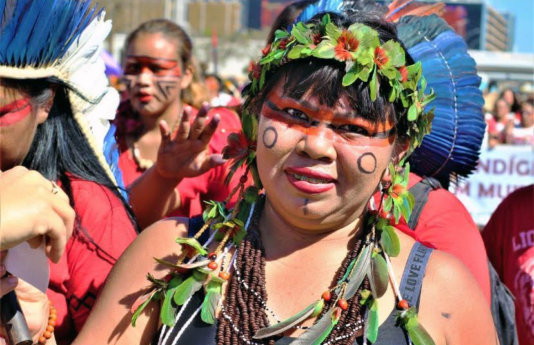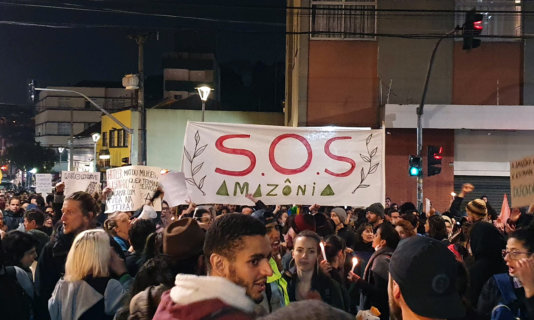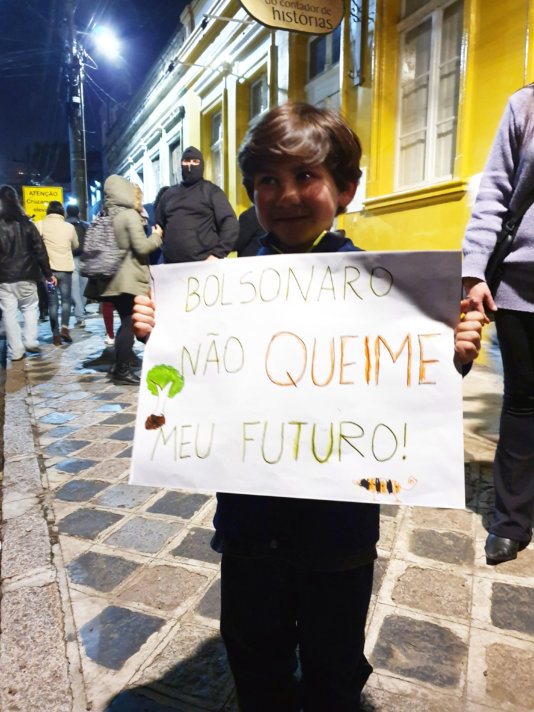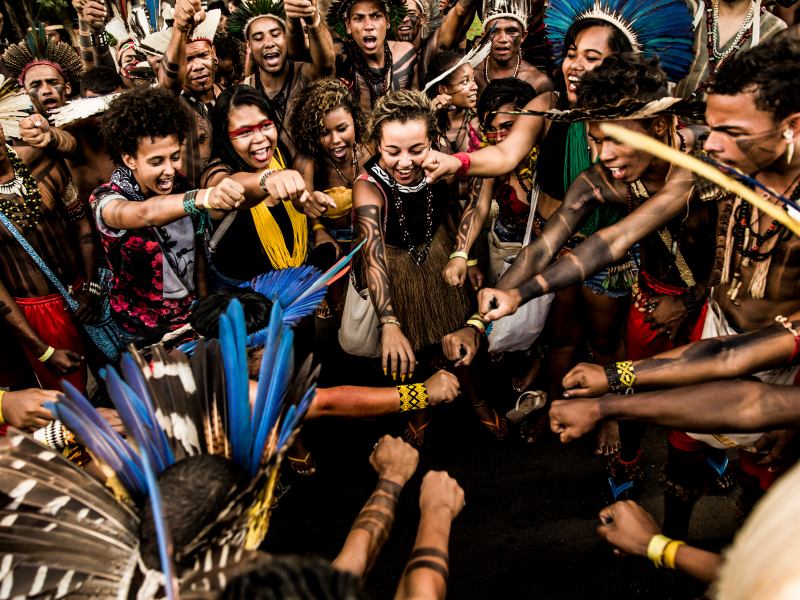- About
- Topics
- Picks
- Audio
- Story
- In-Depth
- Opinion
- News
- Donate
- Signup for our newsletterOur Editors' Best Picks.Send
Read, Debate: Engage.
| August 26, 2019 | |
|---|---|
| topic: | Indigenous people |
| tags: | #Brazil, #Amazon, #indigenous people, #women's rights, #Bolsonaro |
| located: | Brazil, France, Canada |
| by: | Ellen Nemitz |
The number of fires has raised 84% in 2019, and the fog has affected even São Paulo, miles away from the states which are facing the problem — the city became dark in the middle of the day, scaring its inhabitants.
Everyone is outraged over President Jair Bolsonaro’s environmental policies, which are being pointed by activists as the main reason for record number of rainforest's fires, due to weakening surveillance and a deforestation encouraging speech. People also asked for Environment Minister, Ricardo Salles, to leave position, as he is not committed to environment protection.
Besides being source of 20% of the world’s oxygen and a way to stop climate change, as forests can capture carbon dioxide from atmosphere, Amazon is home for more than 500 thousand indigenous people from more than 300 different ethnicities, some of them still without contact with white people. Under threat, indigenous populations are one of the main protectors of nature: “Without territory we cannot do other things, we cannot discuss education and health. Land is our greatest patrimony. Land is our mother, where we get stronger, where we find strength to fight. Our ‘enchanted' from our forests give us strength to fight”, explains Simone Eloy Terena, an indigenous leader who is nowadays advisor for Liberty and Socialism Party (PSOL, in Portuguese).
Simone Terena and other three thousand indigenous women are the proof that they will not give up their land. The First Indigenous Woman’s March, themed “Territory: our body, our spirit”, was held in Brasilia, capital city of Brazil, in the beginning of August, raising voice for indigenous needs. "It was an historic mark for indigenous feminism", she says. She tells us that usually women are ashamed to talk during meetings and assemblies, even though they are not forbidden: “The march empowered us to go back to our villages with arguments, knowing how is to fight for our rights, and to empower other women. And this is just the beginning”.
Terena is co-founder of a project called Indigenous Women’s Voice, implemented by UN Women. She tells that the project allowed some women to be multipliers of knowledge and empowerment about some issues like politics and violence against women. One year and a half later, the march happened. “The project came to strengthen and guide us. Indigenous women are begging to occupy spaces like university, in addition to the traditional role of taking care of children and maintaining culture alive”, explains the woman, who has a Phd degree in Anthropology.
She talked to FairPlanet still very touched, thrilled by the experience of meeting women from all over the country toward the same goal: fighting for the rights of indigenous people. “When we see those indigenous women moving from their villages, sometimes in a boat for eight hours until the closest city, then taking the bus to Brasilia, we see how they are unsatisfied with what is happening in Bolsonaro’s government. Being with them during these days was emotive, a moment of learning, strengthening, exchanges, empowerment. It was a moment to rethink. Indigenous feminism is a way to defend our collective rights”, she says.
Resisting is part of indigenous lives since many decades ago. Victims of a cruel process of colonization in the 1500’s, it was only in 1988 that State recognized their rights constitutionally, after the end of military dictatorship. But it was not enough. “We have always had to fight for our constitutional rights. With Bolsonaro’s government, this is getting more intense. But we will not go back because of his statements. We are going to the streets to defend our rights and territories”.
In 2019 these people went to Brasilia's streets twice, breaking to records of public raising voice for indigenous rights. One of these meetings was the Indigenous Woman March; the another one was Acampamento Terra Livre (Free Land Camp, in English, known for its acronym in Portuguese, ATL). "ATL was historical because Justice Minister and even the president allowed the use of police force to prevent us from camping. But we did not fear. This was the greatest example of cultural citizenship, joining more than four thousand indigenous”, reminds Simone Terena.
By the time ALT was held, in April, Congress was discussing a provisional measure to delegate demarcation of indigenous' territory to Agricultural Ministry, instead of Justice Ministry, which was considered an huge threat — the Supreme Court ended up suspending the measure end giving back this assignment to Funai (Indigenous Foundation), linked to Justice Ministry.
In August, though, Bolsonaro stated one more time that as long he is the president "no indigenous land will be demarcated", as this could hinder economic development and indigenous already have enough land, according to him. Despite Bolsonaro’s speech, however, development is unsustainable if forests are cut down and burnt, and agricultural lobby is one of the major problems for protecting forests — there are indications that farmers are the responsible ones for “fire days”, which is probably causing destruction in a range never seen.
World leaders, like French President Emmanuel Macron and Canada Prime Minister Justin Trudeau, consider the situation in Amazon forest an international crises, and will join to demand a solution from Brazil’s government. Environmentalists struggle to stop the fire and to protect the biodiversity of Brazilian rainforest. The world is asking for solutions. Meanwhile, indigenous people keep resisting: Camila da Silva, a 33 years old woman from Kaingang ethnicity living in Curitiba, says: “those who do not have empathy do not understand what is collective fight. Indigenous people fight together. We, indigenous women, have been always warriors, and we will not give up”.
By copying the embed code below, you agree to adhere to our republishing guidelines.




